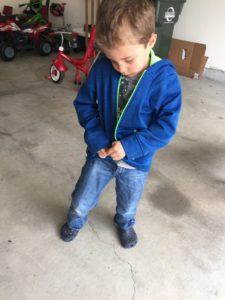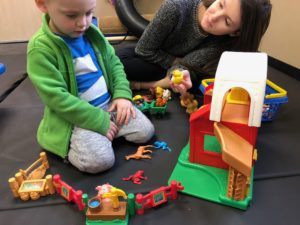Parenting
For a child, getting themselves dressed is a big accomplishment and can boost their self-esteem. There are many skills that are needed to get dressed including fine and gross motor skills, bilateral integration (the ability to use both sides of your body together with coordination), sequencing (putting skills together to achieve a final task), strength, motor planning (the ability to determine and carry out a series of motor actions), and sensory processing.
Children can begin assisting with dressing before their first birthday and gain independence in the upcoming years before being able to fully dress themselves at age 5.
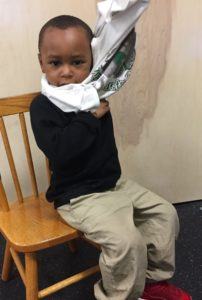
What dressing skills should my child be able to do and at what age? The answers are below. Encourage the skill prior to the age it should be mastered. At first you will have to completely do the skill for your child. Talk to your child telling them all the steps to complete the skills. Progressively ask your child to help you with each step. Praise your child for their help with the task and successful completion. You will be teaching your child pride, sense of accomplishment and trust that you think they can. Great job parent!
By the time a child is 1 years old:
Your child should be able to take his shoes and socks off.
He/she should push their arms in sleeves once the shirt is placed over their head.
A 1 year old should push legs into pants when the pants are held for them.
By the time a child is 2 years old:
He/she should be able to help pull pants down.
A 2 year old should remove their own jacket.
By the time a child is 3 years old:
A 3 year old should be able to take off pants.
He/she can button and unbutton large buttons.
Your child will unzip and zip jacket once zipper is started.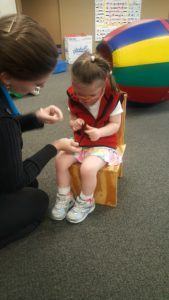
Three year old’s put on socks and shoes by themselves.
By the time a child is 4 years old:
He/she should be able to put on shirt and pants independently.
A 4 year old can take off his/her own shirt.
At this age, your child can snap, button, zip, and buckle a belt.
Putting socks on correctly is a skill at age 4.
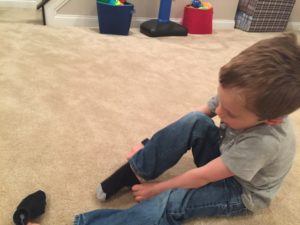
By the time a child is 5 years old:
Your child should be able to dress and undress himself including all fasteners and tie his shoes! You now have extra time for you!!
Continue to challenge your child now that you know what skills they should be doing and when. Push their potential to be independent. Praise their successes!
This is the way to raise a happy, confident child!!
If you need help teaching your child skills reach out to ABC Pediatric Therapy Network. We are here for you! If you have questions, call us or visit our website at https://www.abcpediatrictherapy.com.
Read More
ABC Pediatric Therapy Network is always about progress! If you are receiving services somewhere other than ABC Pediatric Therapy Network and your child is achieving success, DO NOT change a thing. That is what ABC is all about …. SUCCESS! We want your child to be consistently showing progress. We, like you, want your child to reach their maximum potential.
View this post on Instagram
Testimonial Tuesday! Tell us something great about your child’s therapist!

If your child is not achieving success….at school, home therapy, outpatient therapy…. ask more questions. Ask what the goals are and why your child is not achieving them. Maybe modify the goals or the strategies to achieve them. Is your team on board to create change that is responsive to your child’s needs?! Let’s hope so!
Perhaps now is time for a change.
If you are receiving therapy at school, call an IEP meeting to discuss strategies. You might be able to increase the minutes your child is seen. Maybe you just need to modify the approach to the goal. You could change the location where the goal is being worked on – if in the classroom, try a private room. Maybe your child is being seen in a group and one on one would be better. Perhaps the stairs in the school are not motivating but the stairs to the playground are.
Add additional outpatient therapy to increase the intensity to reach goals. Having another perspective from another therapist can be beneficial. Private therapy is usually individual and this increased intensity might be just what your child needs.
Is summer approaching? What is your plan to push potential during the summer?
Are you at an outpatient facility and your child needs a change? Each outpatient therapy office has a different approach to treatment. Take a tour at another facility to see what best meets your child’s needs.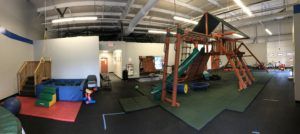
Therapy…success…change…progress – is all about communication. Your therapy team needs to listen to your and your child’s wants/ needs and modify the plan of care constantly to be responsive to you and your child. If you have found that…great! Celebrate the small victories and push for the big wins! If you have not found that, do not stop advocating for your child. You are often their voice as well as their cheerleader!
*Find the therapy approach – outpatient, school, one on one or group – that succeeds in ensuring your child progresses.
*Increase communication – update or change goals to accomplish more developmental milestones.
*Increase frequency – attend therapy more often or add outpatient to school therapy.
Whatever you do, do not stop trying something new or something different than what you are doing now until you see the progress you want for your child.
You know your child best. Achieving developmental milestones increases self esteem in your child. Feeling like you can do the same tasks as your friends creates a sense of acceptance and achievement.
Empower and educate yourself at www.abcpediatrictherapy.com. Reach out to ABC if we can help you in any way!
Read MoreThe ABC Interactive Screening Tool was developed to empower the parent. We want parents to know what to challenge and when. We do not want your child arriving at preschool or kindergarten not being able to cut, put on their coat or eat the snack provided. What can you, as a parent, do to ensure your child is reaching their potential? The answer…. get educated. We want to help! First, click below to fill out the online screening tool.
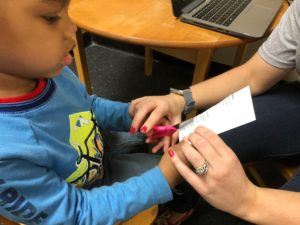
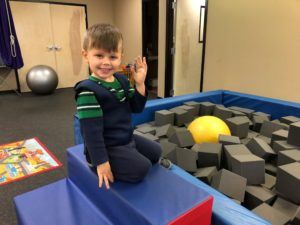
Ok, you have filled out the tool. Now what?!?
The tool was designed to be a quick look at how your child is doing. A chance for you to take a look for yourself. Try age appropriate skills with your child to really see for yourself how they are doing.
It is important to understand that this was just a glimpse. A full evaluation of skills at each age level would look at 50 or more skills where this tool only looks at 7- 10 skills for gross motor, fine motor and speech/language skills.
If your child misses 2 or more skills in any one area, we recommend an evaluation of those skills by a licensed therapist. Why? A therapist will be able to teach you what to encourage at home and how. Therapy may or may not be recommended for your child. A therapist wants to ensure that each child reaches age appropriate milestones in a timely manner.
If your child misses 2 or more skills when we are assessing 7-10 skills in the Interactive Screening Tool, we expect that they might miss significantly more when assessing 50 skills in a formal evaluation!
What could happen if my child is behind on skills?
Compensatory patterns could develop if your child is not achieving milestones. Your child may try to figure out how to achieve a skill even though muscle weakness exists. This may lead to the development of bad patterns that will affect future skills. For example, speed and agility for sports may be affected if a child does not develop higher level balance skills like 1 foot standing or walking on a balance beam. A child that does not spend time on his belly may show signs of weakness in his trunk or arms effecting handwriting or scissor cutting later. Children that do not like to climb on jungle gyms or swing on swings might find that riding a 2-wheeler is challenging in the future. This could affect social skills and friends as their friends will take off on their 2 wheeled bikes leaving your child behind to find a more sedentary activity to play.
Why does it matter if my child achieves skills on time?
As a parent, we want our children to succeed at their fullest potential. If our child like Legos or playing the trombone or playing football, all are great. We do not want them to be limited by their motor skills in their choices of what they choose to do or who their friends are. We want them to be able to decide based on their interests not their lack of ability.
For example, if your child chooses not to play sports. That is fine. As a parent, we just do not want him/her not to choose sports due to poor balance or strength.
If your child chooses not to be an artist, we do not want that choice influenced by weak hand/arm muscles. But just that your child prefers something else.
Our job as a parent is to challenge our child at their fullest potential and encourage them to make choices based on their interests.
So get educated. Know what your child needs to know how to do and when. That way you will have the right toys in your house. You will know when to get out the messy glue and paint. You will know when to supervise the scissor cutting. You will know when to leave extra time to “make“ your child tie his/her own shoes or even to be sure they are wearing tie shoes.
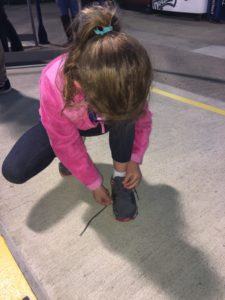
Good job parent! You are now educated on what your child should do and when.
Now, pay it forward!
Who else in your world wants to be an informed parent that can empower their child to reach their fullest potential!?! Share this link with them checklist@abcpediatrictherapy.com!
Let’s change the lives of children together!
You will find answers to many of your developmental questions at https://www.abcpediatrictherapy.com
Read More Skip to content
Skip to content
